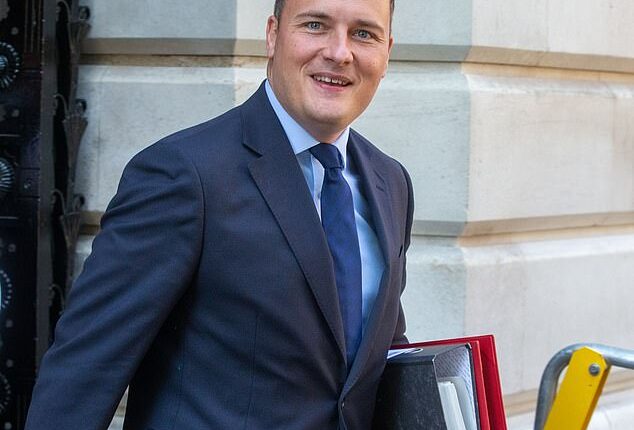GPs have voted to take unprecedented industrial action that could see the number of daily patient appointments slashed by up a third from today.
More than 8,500 family doctors in England took part in the British Medical Association (BMA) ballot, with 98.3 per cent backing the disruption.
It means from today, the union is urging GPs to choose from a list of ten actions, and practices can choose to implement as few or as many as they want.
Patient groups have already described the move as ‘selfish’, warning GPs risk harming those in need of care – and losing the public’s support.
One NHS chief even said the effect of a cap on the number of appointments could be ‘catastrophic’.
The health service has, however, called on the public to still come forward as usual for GP care, despite the collective action.

More than 8,500 family doctors in England took part in the ballot, with 98.3 per cent backing the disruption. It means from today, the British Medical Association is urging GPs to choose from a list of ten actions, and practices can choose to implement as few or as many as they want

Patient groups have already described the move as ‘selfish’, warning GPs risk harming those in need of care – and losing the public’s support. One NHS chief even said the effect of a cap on the number of appointments could be ‘catastrophic’. Pictured, Dr Katie Bramall-Stainer, chairman of the BMA’s GP committee
The ten forms of protest, include one which would put a cap on the number of daily ‘patient contacts’.
This includes face-to-face appointments, remote consultations and online messages.
Under recommendations implemented by the BMA and European Union of General Practitioners, GPs should not deliver more than 25 appointments a day to ensure ‘safe care’.
But some doctors are reportedly having to cram in nearly 90 patients a day in some areas amid an appointments crisis. The average stands around 37.
Patients over the cap would be diverted to ‘local urgent care settings’ such as 111 or walk-in clinics when the total is hit.
As many as 3million GP appointments a month could disappear if family doctors push ahead with the plans, according to estimates by primary care leaders.
Other measures include refusing to co-operate with standard NHS systems, such as those used to refer patients to hospital specialists or to share data with local health planners.
During the action, practices are still required to be open between 08:00 and 18:30 Monday to Friday.
Earlier this week, Dr Katie Bramall-Stainer, chairman of the BMA’s GP committee said the action aimed to ‘bring the NHS to a standstill very quickly’.
However, she insisted: ‘It is industrial action, but the target isn’t patients. The target is NHS England [and the] Department of Health.’
Responding to the ballot result today, she added: ‘We have no choice but to move ahead with collective action to protect our practices, and our patients.
‘This will not be a “big bang”. It will be a slow burn. It’s likely that impact may not be felt for some time.
‘We hope this will give the new Government time to consider our proposed solutions including fixing our contract once and for all.
‘General practice should be the front door of the NHS, not the doormat.
‘We don’t want to have to take this next step but must if we’re to stop our services from collapsing completely.
‘A key Labour manifesto promise was to bring back the family doctor, and we look forward to making sure that can become a reality as soon as possible.’
Because the vote was not a statutory ballot for industrial action, the union did not have to give notice of its actions and can start immediately.
The turnout was just 67.7 per cent, meaning one in three GPs eligible to vote did not do so.
Dr Amanda Doyle, NHS National Director for Primary Care and Community Services, said: ‘GPs and their teams are the bedrock of the NHS, and we recognise they are working really hard and dealing with record demand.
‘On behalf of patients, the NHS has a duty to plan for collective action, and we will continue to work with government to find a resolution and end collective action.
‘Our message to the public remains the same — they should continue to come forward for care during this collective action, as GP practices will remain open.’
It comes as the Goverment today announced it had added GPs to the additional roles reimbursement scheme (ARRS), in the hope practices will be able to hire 1,000 more doctors this year.
The ARRS scheme was introduced in 2019 and lets primary care networks, groups of GP surgeries operating in the same area, hire for other roles such as podiatrists and occupational therapists and claim reimbursement for their salaries.
Health secretary Wes Streeting added £82million to the £1.4billion ARRS pot to fund what he described as an ’emergency measure’.
The expansion of the scheme aims to allow practices to hire ‘newly-qualified GPs’ who face potential unemployment this summer.
This announcement follows the Government’s commitment earlier this week to increase GP pay by 6 per cent, following the doctors’ pay review body recommendation.
But senior medics claimed the uplift did not go far ‘enough to address the erosion’ of GP funding.
GPs have not staged collective action since 1964 when family doctors handed in undated resignations to Harold Wilson’s Labour government.
A proportion of GPs, however, staged industrial action in 2012 in protest against increases in pension contributions and a later retirement age for doctors.
Estimates suggest around just a fifth to a third of practices took part in the action.
But the BMA has led recent walkouts by junior doctors and consultants, hampering efforts to clear waiting lists that built-up during the pandemic.









